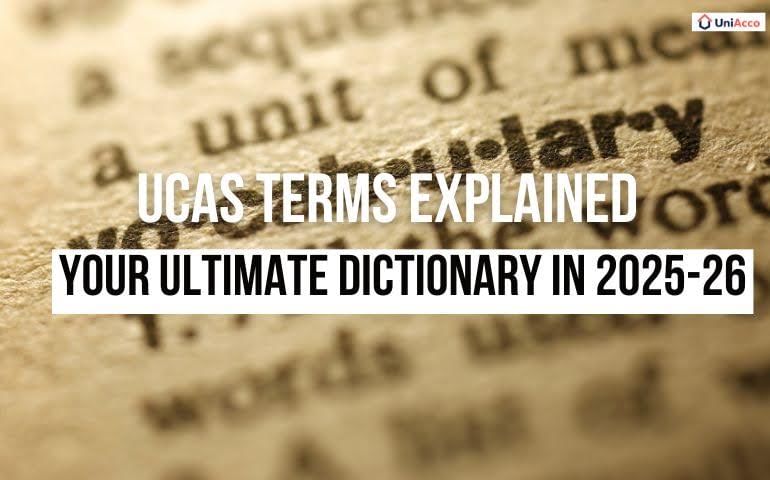Applying to university involves navigating a range of terms and processes unique to the UCAS system. Whether you are just starting your application, awaiting offers, or preparing for Clearing, understanding these terms is essential to managing your journey confidently and making informed decisions.
This guide explains the key UCAS terms you need to know for 2025-26, helping you grasp not only their definitions but also their practical importance throughout every stage of your application.
Why Knowing UCAS Terms Matters?
- Navigate the process confidently: Understanding UCAS jargon helps you move through each stage without confusion.
- Respond promptly: Knowing UCAS terms like “Track,” “Clearing,” and “Adjustment” ensures you meet deadlines and don’t miss opportunities.
- Communicate clearly: Using the right language when contacting universities or advisors builds professionalism and avoids misunderstandings.
- Make informed decisions: Grasping key terms helps you understand offers, rejections, and next steps accurately.
- Maximise your options: Familiarity with UCAS terms unlocks smoother use of alternatives like Clearing or Adjustment if your initial application doesn’t go as planned.
- Reduce stress: Being prepared with the right knowledge eases anxiety and makes the application journey less overwhelming.
- Stand out as a serious applicant: Showing that you understand the process reflects well on you to admissions teams.
- Save time: Avoid unnecessary delays by knowing exactly what’s expected at each stage.
Essential UCAS Terms To Know
Below, we explain the most important UCAS terms relevant to your entire application experience. Understanding these will help you confidently manage your application, respond to offers, and explore all available pathways to university.
Adviser
An adviser offers guidance, support, and information throughout your application process. This can be a teacher, tutor, careers counsellor, or an educational agent helping you navigate UCAS.
Agent
Agents, also known as educational consultants, work internationally to represent UK universities, colleges, or language schools. They usually have agreements with institutions and receive commissions based on successful student placements.
Buzzword
When applying through a school or college, you may be given a buzzword—a special code that links your application to your centre. This code must be entered when registering on the UCAS system.
Centre
A centre refers to any school, college, or organisation that assists students with their higher education applications.
Changed Course Offer
If you don’t meet the original conditions or a university changes its available courses, you might receive a changed course offer. This could mean different start dates, entry points, or even an alternative course.
Choice
Each choice represents a different course you apply to. You can select up to five options to maximise your opportunity of receiving an offer.
Clearing
Clearing is an additional UCAS service available to applicants who didn’t receive an offer, declined their offers, or didn’t meet the required grades. It allows you to apply for courses with vacancies after the main application cycle.
College
A further or higher education provider which can also be referred to collectively with universities. When people say ‘applying to university’, this often includes colleges as part of the term.
Conditional Offer
This type of offer means you’ve been offered a place on the condition that you meet certain requirements, usually your exam results.
Confirmation
Once you meet the conditions of a conditional offer, confirmation occurs when your place becomes guaranteed and your offer unconditional.
Conservatoire
An institution specialising in performance arts education such as music, dance, drama, or screen arts.
Contextual Admissions/Offers
Some universities consider your individual circumstances – such as your background or school area – when making an offer. This might involve reduced entry requirements or extra support.
Course
A course is the programme of study you apply for, which could range from foundation degrees to doctorates across various subject areas.
Course and Training Providers
This term covers universities, colleges, conservatoires, and other approved institutions offering higher education courses.
Deferral
Deferral allows you to delay starting your course until the following academic year, while retaining your offer.
Entry Requirements
The qualifications or experience a course provider suggests you need to meet to be considered for admission. Meeting these does not automatically guarantee a place.
Extra
UCAS Extra lets you apply for additional courses one at a time if you don’t have any offers from your original choices.
Fresher
A slang term for students in their first year at university.
Firm Choice
The offer you choose to accept as your first preference, where you intend to study if all conditions are met.
Further Education (FE)
Education undertaken typically after compulsory schooling but before higher education, including A levels or vocational qualifications.
Gap Year
A break year usually taken between finishing school and starting university, often used for work, travel, or volunteering.
Graduate
Someone who has completed an undergraduate degree and may pursue postgraduate study.
HEP (Higher Education Provider)
Universities, colleges, or conservatoires recognised for offering higher education qualifications.
Higher Education (HE)
Post-secondary education at undergraduate or postgraduate level, such as degrees and diplomas.
Insurance Choice
Your backup choice in UCAS, selected in case you don’t meet conditions for your firm choice.
Invitation
An invitation from a university for an interview, audition, or to submit additional work like a portfolio or essay.
League Tables
Rankings of universities or courses based on factors like reputation, research, or student satisfaction.
National Insurance (NI Number)
A unique personal number issued by HMRC required for student finance and other official processes.
Personal ID or UCAS ID
A ten-digit number assigned when you start your UCAS application, used for tracking and communication.
Personal Statement
A written piece included in your application that explains why you want to study your chosen course and why you’d be a good candidate.
Point of Entry
The year level you start in a course, e.g., year two for some degree courses with advanced entry.
Postgraduate
Courses taken after completing an undergraduate degree, such as Master’s or doctoral programmes.
Predicted Grades
Teachers’ estimations of the grades you are likely to achieve in upcoming exams, used by universities when assessing applications.
Referee
The person who provides a written reference to support your application, often a teacher or adviser.
Reference
A formal recommendation from a referee included in your application, highlighting your abilities and suitability.
Sandwich Course
A degree that includes a placement year in industry, providing work experience alongside academic study.
Scheme Code
A code combined with your Personal ID that categorises your type of UCAS application.
Tariff
The UCAS Tariff converts your qualifications, such as A-levels or BTECs, into points to aid admissions decisions.
Transcript
An official academic record listing the qualifications and grades you have achieved.
UCAS
The organisation responsible for managing UK undergraduate university applications and admissions.
UCAS Conservatoires
A separate application system for performance-based courses in music, dance, drama, and other creative disciplines.
UCAS Hub
The online platform where you can research courses, apply, and track your application.
Unconditional Offer
An offer that guarantees you a place without requiring further conditions.
Undergraduate
The first level of university study, typically leading to a Bachelor’s degree.
University (Uni)
An institution that provides higher education degrees and research opportunities.
Unsuccessful
When you don’t receive an offer or fail to meet conditions required for an offer.
Withdrawal
When you or the university removes a course choice from your application before a decision is made.
A Level
A widely recognised academic qualification in England, Wales, and Northern Ireland, typically studied over two years as part of further education.
AS Level
The first half of a full A level qualification, often taken after Year 12.
Advanced Higher
A Scottish qualification usually taken by 16–18-year-olds, following the completion of Highers.
Bachelor’s Degree
An undergraduate degree generally lasting three or four years, such as a BA or BSc.
BA
Bachelor of Arts, a common type of undergraduate degree.
CertHE
Certificate of Higher Education, typically a one-year qualification equivalent to the first year of a degree.
DipHE
Diploma of Higher Education, usually awarded after two years of full-time study.
First Class Honours
The highest classification of a UK undergraduate degree.
GCSE
General Certificate of Secondary Education, exams taken by students aged 14–16 across England, Wales, and Northern Ireland.
Higher
A Scottish qualification normally taken by students aged 16–18 that is key for university entry.
Higher National Certificate (HNC)
A vocational qualification roughly equivalent to the first year of a degree.
Higher National Diploma (HND)
A qualification equivalent to the second year of a degree, often used to transfer to university courses.
Honours
A classification indicating the degree level and quality, often requiring a certain standard or project completion.
MA
Master of Arts; either a postgraduate degree or, at some ancient universities, an undergraduate degree.
National 4 and 5
Scottish qualifications taken by students aged 14–16.
Ordinary Degree
A degree without honours, sometimes awarded if honours criteria are not met.
Postgraduate Research (PGR)
Research-based degrees pursued after graduation, such as PhDs.
Postgraduate Taught (PGT)
Postgraduate courses involving taught modules along with thesis or dissertation.
Sandwich Course
A degree incorporating a paid work placement year in industry.
Second Class Honours
Undergraduate degree classification is split into upper division (2:1) and lower division (2:2).
Third Class Honours
The lowest honours degree classification awarded.
Campus University
A university with all facilities, including accommodation and lecture halls, located on one site.
City University
A university with facilities spread across a wider urban area.
Clearing
Process that allows students without offers or who haven’t met conditions to find courses with vacancies during the results period.
Conditional and Unconditional Offer
Conditional offers require meeting certain criteria; unconditional offers guarantee your place regardless.
Firm Choice and Insurance Choice
Your first preferred course offer and a backup option in case you don’t meet your firm choice conditions.
Gap Year
A break year typically used for work, travel or volunteering before starting university.
Halls of Residence
University-owned student accommodation popular with first years for community and convenience.
LNAT
The National Admissions Test for Law, required by some UK universities for law applicants.
Open Day
Events when prospective students can visit universities to explore facilities and meet staff.
Oxbridge
A collective term referring to the universities of Oxford and Cambridge.
Personal Statement
An essay explaining your motivation for applying and your suitability for the course.
Reference
A recommendation from a referee added to your UCAS application.
Russell Group Universities
A group of 24 UK research-intensive universities known for academic excellence.
UCAS Extra
A service that allows additional applications if you have no offers after your initial choices.
UCAS Tariff Points
Points assigned to qualifications to compare entry requirements across different courses.
Knowing these UCAS terms helps you make informed choices throughout your application, from selecting courses and understanding offers to managing Clearing if things don’t go as planned. It also helps you communicate effectively with universities and advisers, making the entire process clearer and less stressful.
Also read: How To Apply To Universities In The UK Through UCAS?















0 Comments